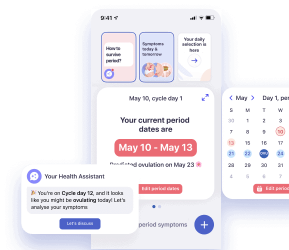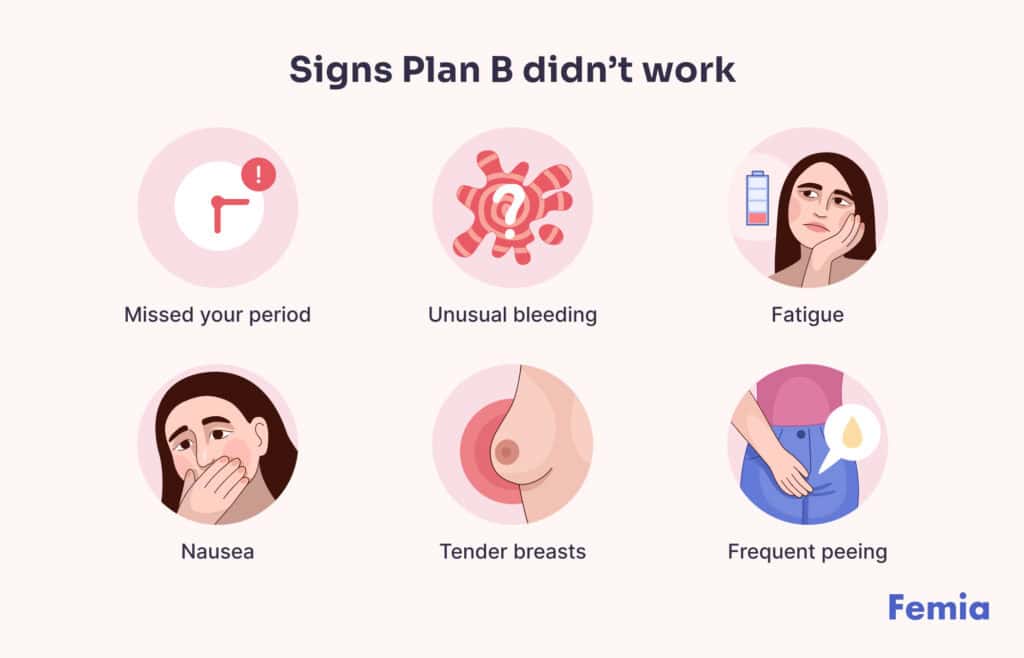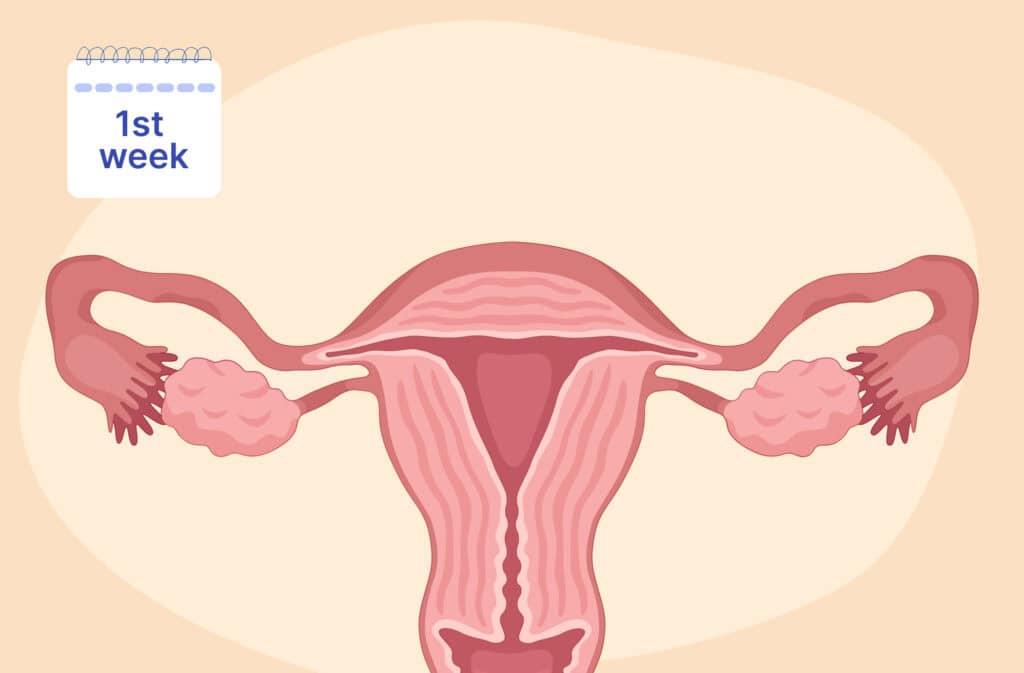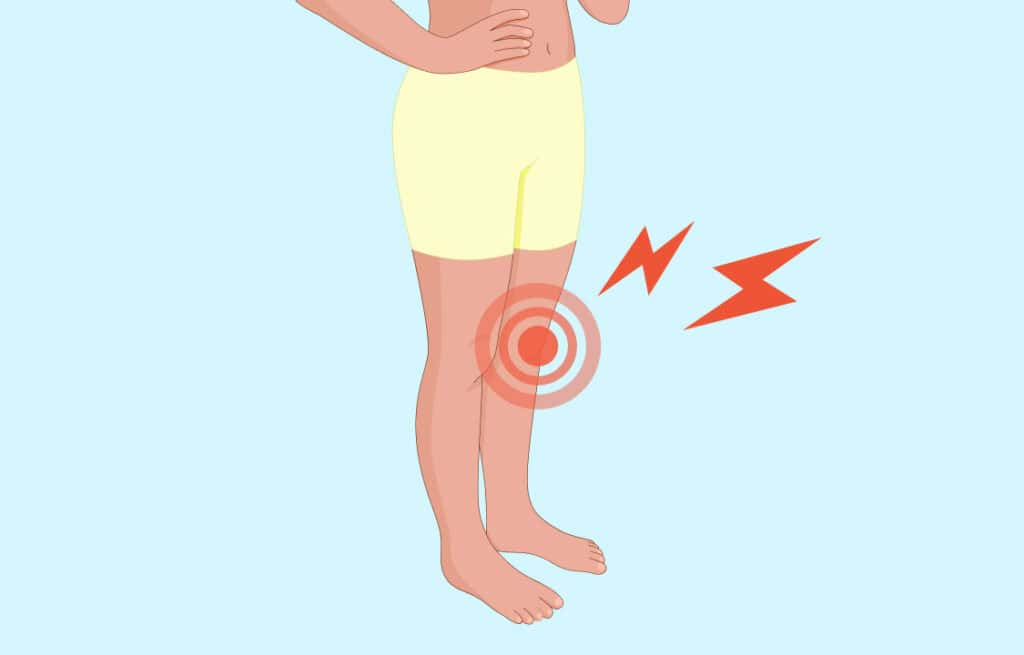Femia > Health Library > Your cycle > Health > Signs Plan B didn’t work: What to watch for and what to do next
Signs Plan B didn’t work: What to watch for and what to do next

- Updated Mar 2, 2025
- Published
CRAFTED BY HUMAN
Crafted by human At Femia, we provide accurate and up-to-date information at every stage of your journey, from trying to conceive, pregnancy and postnatal support. All content is created by a real person based on in-depth research and own professional experience. Femia ensures that you will receive expert advice, strict accuracy and a personalized approach from our authors/medical experts. Learn more about our editorial policy.
FACT CHECKED
Fact checked At Femia Health, we maintain the highest standards of editorial excellence in delivering content focused on helping you conceive, guiding you through pregnancy, and supporting you postpartum. Explore our content review principles to learn how we ensure the accuracy and quality of our health and lifestyle tips for every stage of your journey.
- The FDA confirms that Plan B One-Step works by suppressing or delaying ovulation and has no direct effect on post-ovulation processes such as fertilization or implantation.It’s most effective when taken as soon as possible after unprotected sex, ideally within 72 hours. If ovulation has already occurred, there is no guarantee that morning-after pills will work.
- Common signs that Plan B didn’t work include your period being late, experiencing unusual bleeding, or pregnancy symptoms like nausea or tender breasts. If any of these occur, take a pregnancy test after two weeks and reach out to a trusted healthcare provider for guidance and next steps.
Plan B, also known as the morning-after pill, is a safe and effective form of emergency contraception. When taken correctly – as soon as possible – it is quite successful at preventing unwanted pregnancy after unprotected sex.
You might be wondering: does Plan B always work? No, it may not work in certain cases. It’s important to remember that Plan B should only be used in emergency situations and not as regular birth control.
Today, we will dive into the science behind emergency contraception and explain why it sometimes doesn’t work. Most importantly, you’ll learn how to know if Plan B worked and be able to recognize the common signs of both scenarios. We will also help you navigate the next steps and explore all of your options.

How does Plan B work?
Plan B works by preventing or delaying ovulation. The concept is simple: no ovulation, no pregnancy. When the egg doesn’t get released from the ovary, it cannot meet the sperm and be fertilized. But, it gets a little more complex than that.
There are 3 main types of emergency contraceptive pills:
- pills containing levonorgestrel (a type of synthetic progesterone, also known as progestin)
- pills containing ulipristal acetate (a molecule that attaches to progesterone receptors)
- combined pills containing both estrogen and progestin
All of these substances meddle with the hormonal signals that regulate your menstrual cycle – especially the ovulation phase. As you may know, ovulation happens when luteinizing hormone (LH) levels peak. Morning-after pills work by preventing the sudden release of LH, and therefore indirectly delay ovulation.
Does Plan B always work? Sometimes ovulation has already happened and the egg gets fertilized by a sperm before you even get to take the morning-after pill. There is never a 100% guarantee that Plan B will work.
👉Find out more: Can you get pregnant on your period? Understanding the odds and timing
When does Plan B not work?
There are some instances when Plan B may not turn out to be a success. Here is a list of possible scenarios for those of you looking to answer the burning question: when does Plan B not work?
- Your ovulation has already occurred at the time of unprotected sex. Plan B prevents or delays ovulation, so if you’ve already ovulated, it cannot stop fertilization or implantation.
- You’ve taken the morning-after pill too late. Plan B is designed to work best when taken as soon as possible after unprotected sex. Most morning-after pills should be taken within the first 3 days after intercourse. Learn more about the specifics later.
- You had to throw up within 2 hours of taking the pill. If you vomit within two hours of taking Plan B, your body might not have absorbed the medication. This can reduce its effectiveness, and you may need to take another dose. Don’t do so on your own! It’s best to reach out to your trusted healthcare provider.
- You are taking certain antibiotics or herbal supplements. Some medications, including certain antibiotics, anti-seizure drugs, or herbal supplements like St. John’s Wort, can make Plan B less effective. These substances may speed up how the pill is broken down in your body. Always check with your trusted healthcare provider or pharmacist if you’re taking any medications before using Plan B.
- You are overweight or obese (BMI over 30). According to the World Health Organization (WHO), levonorgestrel-based Plan B may be less effective in ladies with a BMI over 30. This doesn’t mean it won’t work, but its reliability may be reduced. Luckily, ulipristal acetate seems to work just the same in everyone. If you are overweight or obese, talk to your trusted healthcare provider about the best option. Getting a prescription for ulipristal acetate and having it on hand might be a good idea.
Tips for taking Plan B
Plan B is all about timing – but not all morning-after pills work the same. Here is what you should know.
- The readily available emergency contraceptive pills based on levonorgestrel work best if taken within three days (72 hours) of unprotected sex. These are sold at most drugstores as Plan B One-Step®, My Choice™, Option 2®, Take Action™, Aftera®, or Preventeza™.
- Pills containing ulipristal acetate (ella®) work for up to five days (120 hours), but you need a prescription to get them. It’s best to get a prescription ahead of time and have one handy, especially if you are overweight or obese.
- Combined pills are typically taken in two doses. They are known to be less effective and cause intense side effects. Make sure to talk with your trusted healthcare provider about combined emergency contraception before taking it.
Signs Plan B didn’t work

How to tell if Plan B worked? It’s hard to tell that it did – so we usually look for signs that it didn’t. Here is a list of signs that Plan B didn’t work.
- You’ve missed your period. A late or missed period could be one of the earliest signs that Plan B didn’t work and pregnancy might have occurred. It’s also true that Plan B can disrupt your next cycle: some delay is totally normal. Still, if it’s more than a week late, it might be a good idea to take a pregnancy test.
- You’re experiencing unusual bleeding. Some women experience spotting or changes in their bleeding patterns after taking Plan B, which is typically harmless. However, if you notice light spotting about 6-12 days after ovulation, it could be implantation bleeding, which is an early sign of pregnancy. If you’re unsure, take a pregnancy test to clarify.
- You’re experiencing symptoms of pregnancy. Fatigue, nausea, tender breasts, or frequent peeing in the weeks following Plan B may indicate pregnancy. These symptoms often overlap with premenstrual symptoms, so experiencing them can be confusing. We recommend taking a pregnancy test and talking with a trusted healthcare provider.



Does brown discharge mean Plan B worked?
Although signs that Plan B worked are really hard to detect, you might be experiencing some brown discharge after taking the morning-after pill. Does brown discharge after Plan B mean it worked?
Not quite. Brown spotting after taking Plan B is quite common and generally not an indication of the pill’s effectiveness or failure. It is often a sign of hormonal changes, which can happen as your body responds to the high dose of hormones it just received.
What’s more important is to recognize the implantation bleeding after Plan B. Implantation happens when a fertilized egg settles(implants) into the uterus lining. This process can sometimes be accompanied by bleeding, which is typically lighter and lasts shorter than a regular period. It often happens 6 to 12 days after ovulation.
The bottom line is: if the brown discharge is accompanied by other pregnancy symptoms or persists for a prolonged period, take a pregnancy test or consult your trusted healthcare provider to rule out pregnancy.
👉Find out more: Milky white discharge: What it means and when to seek medical advice
How to tell apart spotting from implantation bleeding?
There are a few important differences between implantation bleeding and regular spotting.
| Spotting | Implantation bleeding | |
|---|---|---|
| Timing | Can occur anytime, especially due to hormonal changes (e.g., after taking Plan B or near a period) | Typically occurs 6–12 days after ovulation or fertilization |
| Duration | May last a few hours to several days | Usually lasts 1–2 days, rarely longer |
| Discharge appearance | Light bleeding, ranging from pink to brown or even red. May fluctuate in intensity | Light spotting, typically pink or brown. Rarely heavy or bright red |
How to confirm Plan B worked
The symptoms you might experience after taking Plan B can be confusing. If you are anxious about the outcome, waiting can be quite nerve-wracking. So, how do you know if Plan B worked?
Essentially, the best way to confirm Plan B worked is to wait for your next period. In most cases, your period will return within 3 weeks after taking the pill. If your period arrives on time or with only slight delays, it’s safe to say that Plan B worked.
If your period doesn’t arrive within 3 weeks, it’s a good idea to take a pregnancy test. When is the best time to do an at-home pregnancy test? Wait at least 2 weeks after having unprotected sex and preferably take the test once your period is late. If the test is positive or you’re still not sure, reach out to your healthcare provider to check and discuss the next steps.
What to do if Plan B didn’t work
If you suspect that Plan B didn’t work and you might be pregnant, remember that you are not alone. The first step is to reach out to your trusted healthcare provider. They will confirm whether or not you really are pregnant and talk you through your options.
If you suspect Plan B didn’t work and you might be pregnant, take a pregnancy test and consult your healthcare provider. Plan B does not harm an existing pregnancy, so if you are pregnant, your doctor can discuss the next steps with you.
It’s completely okay to feel uncertain – a healthcare provider can be a great source of support in helping you understand all your options to make a decision that feels right for you and your health. We know that some of our dear readers in the U.S. might sadly be dealing with limited options. Regardless of the situation, know that your healthcare provider will do everything in their power to help you.
Questions from the Femia community
How do I tell the difference between spotting and implantation bleeding after Plan B?
Spotting is a common side effect of Plan B that occurs as a result of all the hormones contained in the pill. It’s usually light and harmless, happening a few days after taking the morning-after pill. The implantation bleeding is rare, lighter, and shorter than a regular period, and occurs usually about 6 to 12 days after conception. The best way to know for sure is by doing a pregnancy test.
Can Plan B fail if I take it at the right time?
Even if you take Plan B at the right time, it can still fail. One of the main reasons for failure is if you ovulate before having unprotected sex since Plan B works by delaying ovulation. Your BMI can also impact effectiveness – if you are overweight or obese, regular morning-after pills may not work as well. In that case, it’s a good idea to reach out to your healthcare provider and discuss taking pills containing ulipristal acetate (ella®).
Can I increase Plan B’s effectiveness?
The sooner you take the morning-after pill, the more likely it is to work effectively. Timing is crucial. The pill is most effective when taken within 72 hours, but it can still have some effectiveness up to 5 days after unprotected sex. It’s always best to act quickly, and if you have any concerns, consult your trusted healthcare provider for advice.
Can I take Plan B more than once in a cycle?
Plan B is an emergency contraceptive and it is not supposed to be used as a regular form of birth control. Taking it often can cause significant hormonal disruptions and intense side effects. Moreover, it may not be as effective when you take it multiple times in one cycle. It’s better to explore consistent, reliable birth control methods with your trusted healthcare provider.
Can I take Plan B during ovulation?
Plan B is less effective if ovulation has already occurred. If ovulation has already taken place, Plan B may not be able to stop fertilization or implantation, which is why timing is so important. If you suspect that ovulation has already occurred, consider consulting with your healthcare provider about other emergency contraceptive options that may be more effective in your situation.
The bottom line
Plan B is a highly effective emergency contraceptive when taken correctly, ideally as soon as possible after unprotected sex. However, it may not work as well if ovulation has already occurred or if you take it more than 72 hours after intercourse.
If you experience signs that Plan B didn’t work, such as a missed period, unusual bleeding, or pregnancy symptoms, the next step is to take a pregnancy test. We know it can be hard to wait, but remember that pregnancy tests are most reliable when taken after your period is expected to start.
Taking a morning-after pill is the way to go in an emergency, but side effects like headaches and throwing up are fairly common. If they persist or worsen, make sure to seek medical care. Your trusted healthcare provider is the best person to consult about the potential pregnancy, the next steps, and all the different options moving forward.
References
- “Emergency Contraception.” World Health Organization (WHO), https://www.who.int/news-room/fact-sheets/detail/emergency-contraception. Accessed 19 Jan. 2025.
- “Emergency Contraception.” Centers for Disease Control (CDC), 19 Nov. 2024, https://www.cdc.gov/contraception/hcp/usspr/emergency-contraception.html.
- “Morning After Pill: What To Know.” Cleveland Clinic, https://my.clevelandclinic.org/health/treatments/23386-morning-after-pill. Accessed 19 Jan. 2025.
- U.S. Food and Drug Administration. “Plan B One-Step (1.5 mg Levonorgestrel) Information.” U.S. Food and Drug Administration, 24 Mar. 2021, www.fda.gov/drugs/postmarket-drug-safety-information-patients-and-providers/plan-b-one-step-15-mg-levonorgestrel-information. Accessed 23 Jan. 2025.

Struggling with the 8-month sleep regression? Learn why it happens, common signs, and expert tips to help your baby sleep better.

Discover what happens at 1 week pregnant, including early signs, body changes, symptoms, and what to expect as your body prepares for pregnancy.

Explore an in-depth guide of the symptoms, causes, treatment, prevention, supplements, and natural remedies for menopause joint pain.

